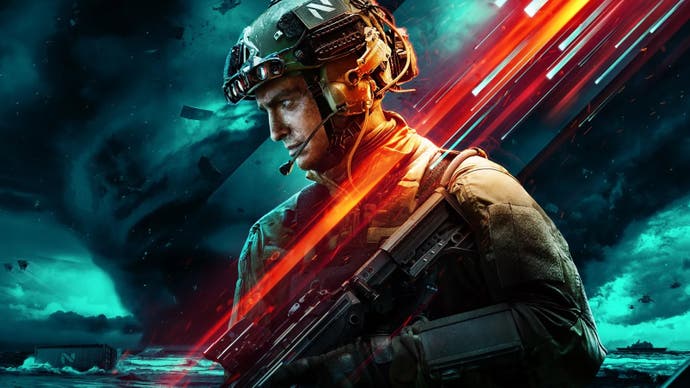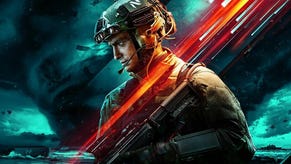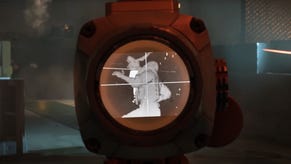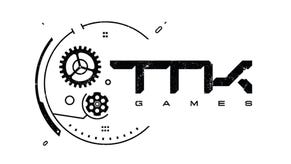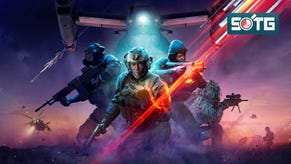After 2042's disastrous launch, what next for Battlefield?
'Everybody was disappointed - our community, our players and our team as well.'
DICE has a history of rocky launches. Battlefield 4 stumbled out of the blocks in 2013 before months of updates got it on its feet, while the microtransactions present in Star Wars Battlefront 2 upon its launch in 2017 saw it draw criticism from all quarters. Battlefield 2042 continued the unwelcome trend, launching with key features missing, extensive bugs and controversial additions such as hero 'Specialist' characters, attracting overwhelmingly negative reviews from players on Steam.
Things have improved but it's taken time, as well as one of the most radical overhauls the series has seen behind the scenes. Last December EA announced an all-star management team was being put in place to help get Battlefield back on track, with Vince Zampella bringing his expertise from overseeing the likes of Call of Duty and more recently Respawn's Apex Legends to manage the franchise, while Halo veterans Marcus Lehto and Alex Seropian are also onboard - Lehto heading up a new studio in Seattle, while Seropian is working at Industrial Toys on Battlefield Mobile.
At DICE's Stockholm headquarters there's a new look team too, as series veteran Lars Gustavsson steps up to creative director while Rebecka Coutaz joins as general manager of EA DICE having previously served as studio director at Ubisoft Annecy. A handful of days after the launch of Battlefield 2042's first season - which introduced new map Exposure, new specialist Lis and handful of new gadgets - Coutaz took some time to answer our questions about the team's commitment to the title, and where it's heading next.
Thanks for joining me, I really appreciate it as I know you must be incredibly busy - and I guess it's been an interesting first six months on the job.
Rebecka Coutaz: Time flies! Well, it's a great moment in time to join DICE, because as you might know this year is exceptional for us. We are celebrating 30 year as a studio, and 20 years on battlefields. So it's a great moment to join. But you know the launch of Battlefield 2042 was a rocky launch. So it was also exciting for that! It's been an exciting six months, I've got to know the team. I've spent a lot of time with our team members, I got to know the other studios that are working on the franchise such as Ripple Effect and the new Battlefield franchise team as well. So yeah, it's been great
Rewinding back to kind of when you joined in December, what was the studio like when you joined it? Because I imagine it must be quite tough when launching a big game like this and then not getting the reception you might have hoped for.
Rebecka Coutaz: Everybody was disappointed - our community, our players and our team as well. It's a team that has invested years of their lives into this game. And for that game not to live up to any expectations from the team or from the players, that was tough. We are moving forward and we've done a lot of things since then.
The first thing we did was to take a step back and work with all the developers that worked across the studio. So DICE, EA Gothenburg, Criterion and ripple effect. And we did a retrospective on what did really work, what didn't work and what do we have to build on? It took us about two months to do that kind of analysis and since then we have made changes in organisation, in structure and tools and processes and communication in co-development, really arming ourselves to be able to make great games and make Battlefield 2042 a great game again.
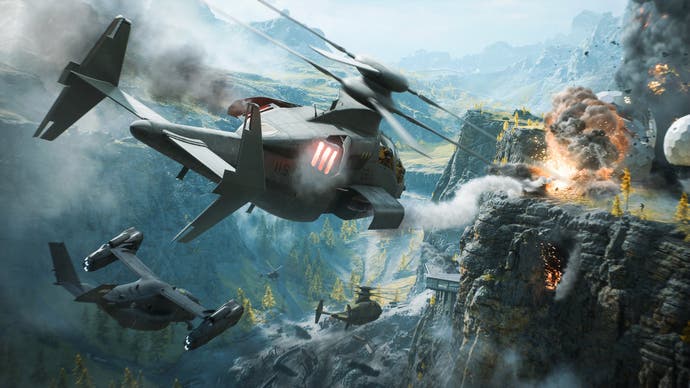
There were multiple reasons behind what happened to 2042 at launch - in your investigations what were the reasons for it launching in the study that you did?
Rebecka Coutaz: There are many topics to that. I would say first probably the organisation, and I think also the experience of working from home, you know there were a lot of teams encountering difficulties in the last two years of shipping a game together. It is different to work from home, even though that is the way we're working now, it took time to adapt. And it took time to know how to work well together. And, and as I said, you know, we got out from the analyzers, the topics that we had to work on.
What were the key things you needed to fix?
Rebecka Coutaz: Well, the first thing was we had four leaders who left from the leadership team - the general manager, the head of content, the head of design, and the executive producer. So I got the opportunity to create a new leadership team around me with whom I govern the studio. It was some of the former leadership team members but also some Battlefield veterans that could step up like Lars Gustavsson who is our creative director for the studio, great producers such as Ryan [McArthur] and Andreas [Morell].
The first thing I did was to create that leadership team together with me with whom we govern the studio, and then just adapt, I would say, Battlefield 2042 for live management because they had been organised to be able to ship a game for launch. That's just the beginning of the journey and we have to get organised to be able to manage live so that we could continue to fix the game's health and to continue to create great content and quality content for our players.
Unfortunately I was away for Summer Games Fest so I didn't get to play season one when it launched, but I did have a crack on the new map this morning. It's gone down really well, and it's a step in the right direction - but it still feels like a relatively small step though.
Rebecka Coutaz: We wanted to focus first on the game health so that we could improve core gameplay mechanics etc and build content on that. Some players have said that there was not enough content, but our focus was really on the quality of the content. And I really think we hit it - we have good feedback from the community so we feel confident.
You've got a roadmap for what's coming ahead as well. How long is support planned for 2042 - there was some speculation and the feeling the team might have moved on already. Is that not the case?
Rebecka Coutaz: We haven't announced anything coming up for the following season, so that will be at a later stage. But just so you know the team here, and the team at Ripple Effect are fully in on Battlefield 2042. We owe that to our community that have followed us for 20 years, we owe that to our players and we owe that to ourselves. I don't want to talk about revenge because that word is too strong - but you know we cannot let ourselves down. And we cannot let our players down. So our focus is on Battlefield 2042.
We've had a couple of steps through the process, you know, we have delivered a couple of patches, each patch was a win for us. And obviously, season one is a win for us. The quality is there. And now we are moving forward, but we're fully in for Battlefield 2042.
So how many people are working on it at the moment? And how is that compared to the numbers I imagined were envisaged, launched further support team after launch after launch.
Rebecka Coutaz: So I'm sure you know that we never share any numbers! But you can feel confident that the majority, the big, big majority of DICE is working on Battlefield 2042 and we have our fellow sisters and brothers at Ripple Effect that are working with us as well. It's our focus.
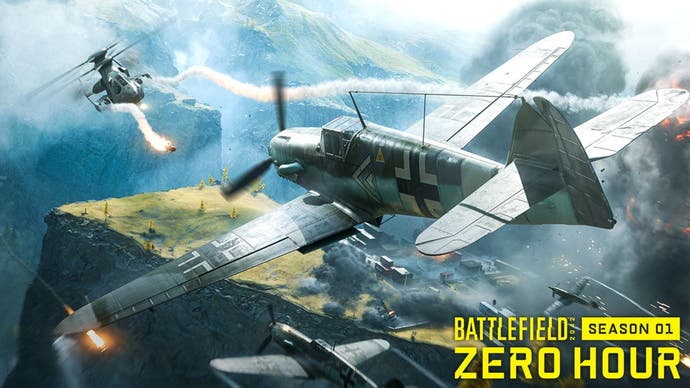
With the player numbers where they are at the moment, does that make that kind of support feasible? Because obviously, the play numbers aren't what I imagined you anticipated?
Rebecka Coutaz: I would say yes, it's according to our plans, so we're moving forward with our plans.
There's a new makeup to this to the team as well, obviously, with Ripple Effects and Industrial Toys on mobile and Marcus Lehto and his new team in Seattle as well - could you break down how this new structure works?
Rebecka Coutaz: On top of that it's a great moment for me to join here as well. And on a personal level, to be able to work with industry legends, like Vince [Zampella] and Byron [Beede] and Marcus [Lehto] and Alex [Seropian], for me it's just very inspiring. You know this team works with us on a daily basis. They're playing the game, they're challenging us and they're giving us feedback. They're really, really involved and they're bringing great experience.
And if you look at what Industrial Toys are doing today, they're making the mobile game for Battlefield, they know how to make mobile games so they are iterating on a great experience that they have while we can continue to iterate on our experience.
Electronic Arts is full-in on Battlefield, Vince and Byron and the leadership team on Battlefield franchise together with myself, we're full-in on that as well. So it's very rewarding, I would say, and a lot of fun. Of course, there are many things that we need to put in place in terms of co-development, communications, etc. But it is a great opportunity and the team here is really happy and pleased because this is actually what the team had dreamt about for many, many years - to finally be able to not only have an experience on PC and console, but also have an experience on mobile.
You've come from Ubisoft and have experience of working with multiple studios on single titles. How does that experience help with this new structure?
Rebecka Coutaz: Ubisoft is very good at co-development and I have many, many years of co-development experience, both at Ubisoft and at Atari and Infrogrames. It's one of my strengths and it's something that's really close to my heart, because I think that by iterating on expertise we get even better and we can create better games. It's a core value for me, co-development. And it's also an opportunity for our teams to work closely with people in other countries with different backgrounds. It's inclusive, and it diversified as well. So I'm trying to apply all those experiences that I have.
DICE has got a good track record of turning things around - it happened with Battlefield 4, it happened again with Star Wars Battlefront 2 and hopefully it's happening as well with 2042. But what's it going to take so that the next Battlefield game things don't start off so shaky, so it's not a case of turning things around and just having a solid foundation?
Rebecka Coutaz:The most important thing is that we learn, and that we learn from our mistakes, and that we fix those mistakes so that we can build something for the future. We are doing that on Battlefield 2042 now and the learnings that we have now will help us for the future, that's for sure.
Where do you see the future of Battlefield? It feels like quite old fashioned saying it's going up against Call of Duty and everything, but in terms of it being a big brand name that's got the mindspace like that, is that where you see it going? What's your big vision for where it's going to be in 10 years time?
Rebecka Coutaz: Well, that's a question! So for me, that's one of the reasons I really wanted to join DICE as well. You know, being Swedish I've looked at DICE all through my career in admiration, seeing the brands they've created, the games they have created and now to be here and work with this team is just fantastic. For me Battlefield is one of the greatest entertainment brands within our industry. And I think, like Vince and Byron and my studio leadership team here, that we haven't optimised it. There are many many things we can do with this brand for the future and I think that is what we're setting out to do. If that is 10 years or five years is to be told - at the moment we are focused on that field 2042 to continue to provide a great player experience.
And finally back to 2042 - can you get it to where you wanted it to be at launch, and to be the big Battlefield we all hoped it would be?
Rebecka Coutaz: We are doing everything we can and I can tell you and it gives me goosebumps, the heart of the team is there. We were too disappointed. And we were disappointed that our players were disappointed. You know, it's our 20th anniversary. How can you disappoint your community after 20 years, you know. We are here and we just want to make it a great player experience.
